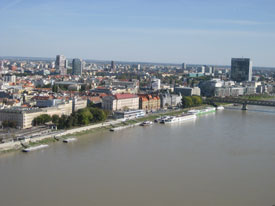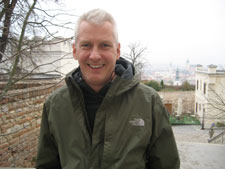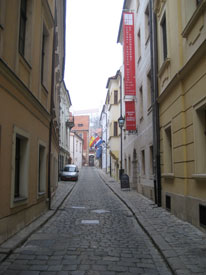Barriers to Entry
An economics professor’s Fulbright experience in Eastern Europe shows that changes in civil society sometimes lag political and economic reforms.

The city of Bratislava as seen from the observation deck of Nový Most (“New Bridge”). The bridge is popularly known as the UFO bridge because the observation deck is shaped like a flying saucer.

Professor Donald Vandegrift was thrilled last year to learn he had won a Fulbright award to teach for a semester at the University of Economics in Slovakia, a posting that promised a rich, multidimensional experience at the country’s top economics program.
A specialist in behavioral economics and land-use policy, he looked forward to exchanging ideas with foreign scholars and observing close-up a society that had transformed its economy over the past two decades. Additionally, the Fulbright application had suggested that faculty and government officials would be interested in hearing his views on both curriculum design and economic policy.
“I began preparing course materials weeks before my departure and sent three boxes filled with textbooks, newspaper clippings, and research papers in a diplomatic pouch to my new address in the capital, Bratislava,” he said. When he arrived last fall, he dove into the country’s language and history through an excellent orientation program put on by the Fulbright staff, moved into an apartment right off the elegant main square, and discovered a Slovakian glory: top-notch, affordably priced beer.
But work at the university quickly fell short of expectations, forcing him to rethink both his professional priorities and personal goals for the semester to come.
First, he was asked to teach an introductory course that barely touched on his areas of interest. What was primarily important, he discovered, was that it was taught in English. And then the librarian informed him that he could not check out books, which was particularly trying because his own materials did not arrive until November, having been sent by the embassy to Brasilia by mistake.
While a couple of graduate students seemed interested in discussing economic policy and current events, faculty members seemed preoccupied and distant, disappearing each day after they finished teaching. He never got to know any of them.

At a bleak moment, while waiting in line for hours in the early morning cold of November for a work permit, he found himself questioning whether it had been worth it. Leaving mid-semester, however, was not an option he even remotely considered.
“I was unwilling to compromise the Fulbright program or give Slovaks a bad impression of Americans,” he said. Instead, he resolved to impart as much valuable information as possible to his students in his short time there. When he learned, for example, that his course was essentially two classes in one—both macro and microeconomics—he thought carefully about how best to cover the material, while making it relevant and interesting.
“I had to decide what would be most important for the environment they were operating in, and ended up devoting a lot of time to the financial crisis in Europe and to topics such as economic growth and inequality. In my classes at TCNJ, I focus on the Federal Reserve Bank, but I did some quick research and was able to shift those discussions to the European Central Bank,” he said, noting that several students expressed their appreciation for his spotlight on current events.

When he saw that the graduate students he’d met knew little of statistics, he brought back a statistical software package after Christmas to load onto their computers, noting, “An understanding of statistics is fundamental to disciplines in the sciences and social sciences. I thought it was important that they have this.”
For his peers, he gave presentations on the U.S. health care system at Constantine the Philosopher University in Nitra, and on the impact of colleges and universities on land prices, and the differences in competitive behavior between men and women, at his home university. About a dozen graduate students turned out for each talk.
Looking back on the experience, Vandegrift said it had provided a gripping view of a hard-working, future-focused country in transition, where the pace of change in civil society understandably lagged some of the bolder political and economic reforms. This created some odd disjunctions, he said. People walking about the city wore tee shirts emblazoned with messages in English—one even advertised “Atl. City, New Jersey”—but showed little interest in interacting with foreign visitors. He attributed much of their wariness and seeming insularity to the legacy of state controls during the Soviet era, noting the lack of civic associations, such as students groups, the prevalence of locked doors, and a residual lack of social trust.
“Slovakians believe, for example, that there was a huge amount of graft and corruption in the sale of state assets when they privatized their economy, but surprisingly, the statistics show very low levels of inequality compared with the U.S.,” he said. And while more affluent than many of its Eastern European neighbors, the country is still playing catch-up with the West. This was clear even at a top university, where many of his students did not have textbooks.
“The convention is for students to go find a textbook however they can,” he said, adding, “there is less hand-holding there partly out of necessity, and maybe that builds better coping skills.”
Vandegrift says he has fond memories of jogging along the graceful Danube and living among beautiful old buildings, some of them dating back to the 1400s. For a land-use expert who has spent years studying suburban sprawl, he said it was fascinating to see cities that “just end, with multistory buildings and then—grass.” While he is not currently working on ideas developed in Slovakia, he notes that, “Clever researchers draw on a wide range of information. You never know where the next good idea will come from.
“Some of the most interesting parts of my trip could be characterized as negative, but the overall experience was not. There is a lot of value in interacting with foreign cultures,” he notes. “And in the U.S., in the biotech industry centered outside Boston, in Silicon Valley, and in the pharmaceutical industry here in New Jersey, talented people from around the country and the world come together, learn from each other, and in the process, make the people around them more productive. Here, too, an appreciation of foreign cultures builds trust and facilitates the exchange of ideas.”
Posted on September 19, 2012

